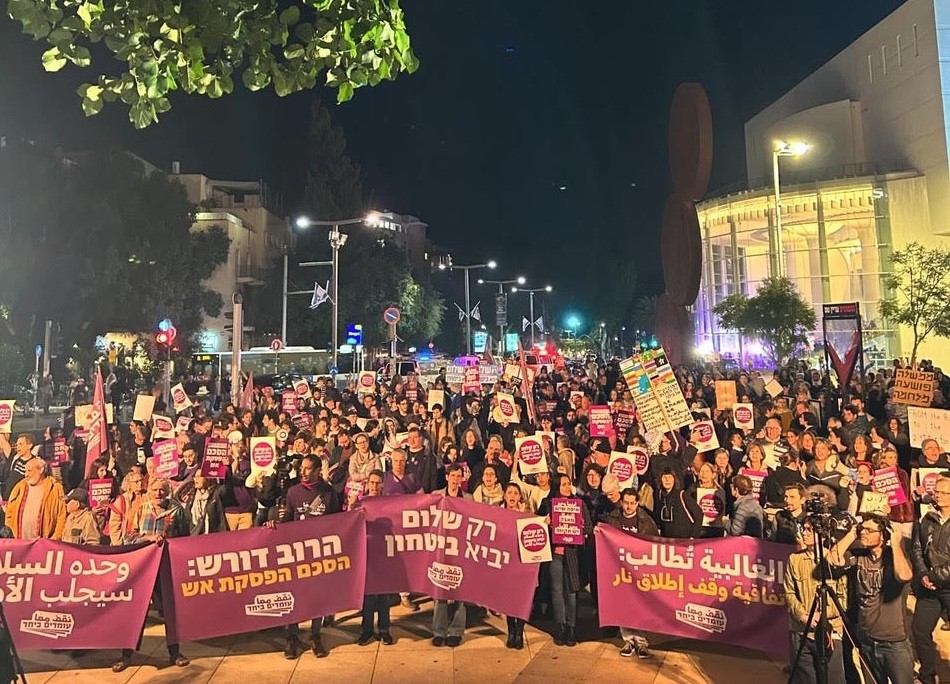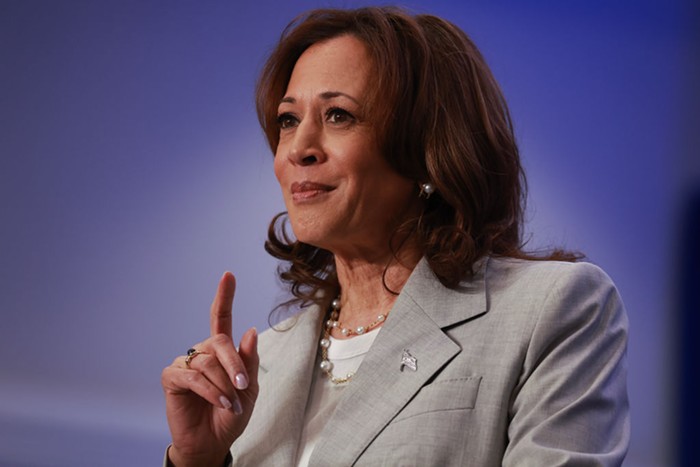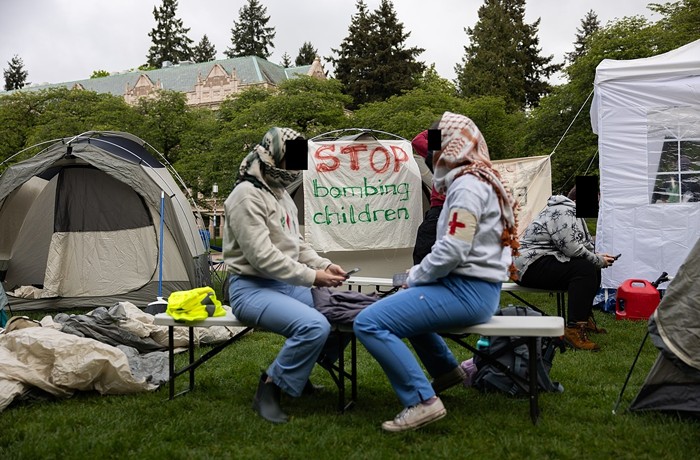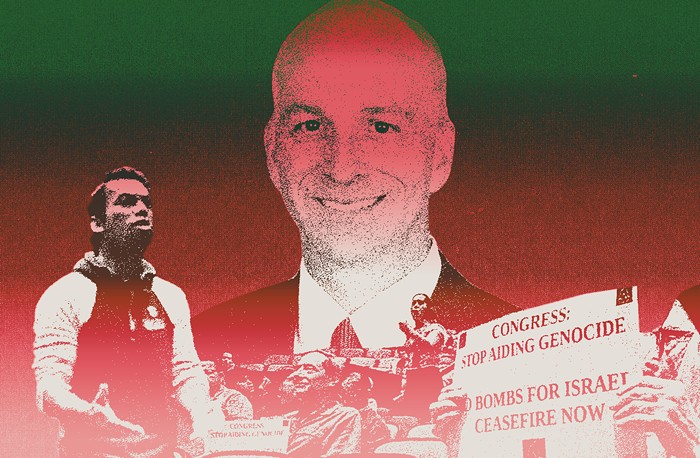We represent a diverse group of Israelis and Israeli-Americans from all walks of life, living in the Seattle area. We are writing to ask you, our local friends and neighbors, for your support in ending the war in Gaza.
As Israelis, we have an ear to the ground for the current mood in Israel: we speak and listen to our friends and family there, read the analyses and op-eds in Israeli newspapers, and participate in Israeli social media. As Seattleites, we have our other ear attuned to the mood here. We think that you are underestimating your power to stop the horrific loss of life in Gaza. A stronger, broader call from Americans for a ceasefire is necessary and overdue.
We were horrified, outraged, and saddened by the acts of Hamas and other militants on October 7, sadistically butchering hundreds of civilians, abducting over 200 people, and wiping out entire communities inside Israel. Many of our Seattle friends and neighbors have extended messages of sympathy to us. Their response is drawn from the humanity of October 7’s victims, not from their religions or nationalities; from the principle that all lives are precious. The US-supported Israeli response to the massacre should have been rooted in these values.
Instead, the Israeli operation in Gaza has turned into a bloodbath. The corrupt Israeli government, led by Benjamin Netanyahu and dominated by extremists, has exploited the war to distract Israelis from its failures in protecting border communities. Over 1% of Gaza’s total population has been killed, the vast majority of them women and children. As the war continues, nearly 200 more Gazans are killed every day. Over 10,000 children have died already, and thousands more have been maimed or orphaned.
A large proportion of the Gaza Strip’s buildings have been damaged and destroyed, including all its university campuses. The health system is shattered. Gaza’s residents have been forced to live without electricity and clean water for nearly four months. The vast majority are internally displaced, crammed into tinier and tinier areas, and subsisting on insufficient food.
Israel’s government claims that it is not intentionally causing this horrific level of death, suffering, and destruction, but this is incompatible with the results on the ground, and it contradicts numerous atrocious statements by senior Israeli leaders. This has led the International Court of Justice to decide with an overwhelming majority that Gaza’s population is at genuine risk of genocide and must be protected.
The Israeli public is now showing some potential for stopping the bloodshed. In recent weeks there has been growing protest and outrage against the government. These protests are driven mostly by concern for Israeli hostages: months of intense military action have not only failed to release the hostages, but actually killed quite a few. Mothers of soldiers, seeing their loved ones placed in harm’s way for dubious aims, have also organized in protest. Some Israelis have bravely broken ranks and spoken out directly against the slaughter of Gazans. They include relatives of UW graduate Dr. Hayim Katsman, murdered on October 7.
Although the vast majority of Israelis hold Prime Minister Netanyahu responsible for the failures of October 7 and expect him to resign eventually, many are willing to wait until after the war. The government now operates under a perverse incentive to prolong the war, buying Netanyahu time to salvage his political career, and creating opportunities for his Jewish-supremacist coalition partners to implement their ethnic cleansing plans.
Past Israeli military adventures have ended mostly because of pressure from the United States on the Israeli government. However, this war has seen an unprecedented duration and intensity of US support. Some of it has been heartwarming, such as Biden’s personal October visit to Israel. But most has been disheartening and damaging: The massive shipment of weapons and ammunition despite civilian carnage in Gaza, the shameful parroting of Israeli propaganda talking points later exposed as false, the meaningless lip-service and sometimes even callousness towards Palestinian civilian lives, the diplomatic stonewalling and watering-down of international action followed by a refusal to hold Israel accountable to even the most watered-down decisions, such as safe corridors and increasing humanitarian aid. More than ever before, in this war the US has been complicit, and it is seen internationally as culpable for Israel’s actions.
In our experience, President Biden’s overall domestic and international policy track record until this war had been relatively enlightened and positive. This makes his Administration’s Gaza war actions even more troubling. What has happened?
We are worried that the high-stakes 2024 election may be clouding the Administration’s judgment and dissuading it from taking effective steps to stop the bloodshed. While the Administration might worry about losing pro-Israel voters to the right, its infuriating behavior is bleeding support from a growing pro-Palestinian contingent and from young voters—both increasingly crucial Democratic voter blocs. Stuck between a rock and a hard place, it is high time that President Biden simply do the right thing: stop this war and make sure it does not resume.
Israel still has other means to resolve its struggle with Hamas. They should absolutely not include destroying the Gaza Strip and pushing its residents to the brink of annihilation. There is now talk of a second hostage-release deal with an associated pause in fighting. The US must not let the bloodshed continue as negotiations drag out–and must not allow the bloodshed and destruction to resume after a brief lull, as had happened in December. Despite rhetoric to the contrary, the US does retain substantial leverage over Israel, if only due to the rate at which the latter is using up its ammunition.
Our duty does not end there: as UN Secretary António Guterres has said, this war is not happening in a vacuum. For two generations we have forced a racist occupation regime upon Palestinians–Israel directly, and the US as chief enabler. In particular, Gaza’s entire population has been living in an open-air prison for nearly 20 years. This was never a recipe for security; it has always been a travesty waiting to turn into catastrophe. The occupation regime must end, once and for all.
A loud and clear demand from ordinary Americans can be a crucial wake-up call, which will help to untie the Biden Administration’s hands and push for an end to the indiscriminate violence. A complete stop to the war is imperative before many more civilians are killed and before this war explodes into a full-blown regional conflict.
We ask you to tell the White House, our US Senators, and other key officials, that the slaughter of civilians in Gaza is an intolerable abomination that must immediately stop, together with a safe return of all hostages. Please also put our leaders on notice that you expect the US to engage fully in persistent diplomatic efforts towards a just peace and an end to the occupation. Please encourage friends and relatives elsewhere in the US to do the same. Please channel the energies, civic involvement, and the organizing skills this region’s citizenry is renowned for to help chart a different future for Israel-Palestine.
Yoni Kallay, a local software developer, was born in Jerusalem and raised in Bellevue.
Zehava Chen-Levy is a clinical chemist and UW Medical School faculty emerita. Born and raised in Israel, she received her PhD from the Weizmann Institute and was a postdoctoral fellow at Stanford University.
Gad Levy is a Seattle resident, born and raised in Israel. An I.D.F. veteran, he has been active, founding member and coordinator of several human rights and Israeli-Palestinian dialogue groups.
Hadar Iron is an architect and ceramicist. Her Master’s thesis was about the borderline between Israel and Palestine, expanding the Line into a mediating crossing Zone. After working at Frank Gehry in LA and architecture firms in Seattle, she founded InFerment Ceramic Studio.
Ra’anan David grew up in Israel, moved to Seattle in 1986 after mandatory military service, was active in some local and national groups, and is urging themselves and others to resume activism.
Assaf Oron is a health statistician at UW. Raised in Jerusalem, he was sent to Gaza numerous times as an Occupation infantry soldier. In 2001 he pledged to refuse to serve the Occupation.



















